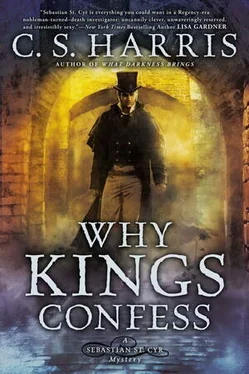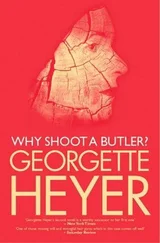C. Harris - Why Kings Confess
Здесь есть возможность читать онлайн «C. Harris - Why Kings Confess» весь текст электронной книги совершенно бесплатно (целиком полную версию без сокращений). В некоторых случаях можно слушать аудио, скачать через торрент в формате fb2 и присутствует краткое содержание. Год выпуска: 2014, Издательство: Penguin Group US, Жанр: Исторический детектив, на английском языке. Описание произведения, (предисловие) а так же отзывы посетителей доступны на портале библиотеки ЛибКат.
- Название:Why Kings Confess
- Автор:
- Издательство:Penguin Group US
- Жанр:
- Год:2014
- ISBN:нет данных
- Рейтинг книги:5 / 5. Голосов: 1
-
Избранное:Добавить в избранное
- Отзывы:
-
Ваша оценка:
- 100
- 1
- 2
- 3
- 4
- 5
Why Kings Confess: краткое содержание, описание и аннотация
Предлагаем к чтению аннотацию, описание, краткое содержание или предисловие (зависит от того, что написал сам автор книги «Why Kings Confess»). Если вы не нашли необходимую информацию о книге — напишите в комментариях, мы постараемся отыскать её.
Why Kings Confess — читать онлайн бесплатно полную книгу (весь текст) целиком
Ниже представлен текст книги, разбитый по страницам. Система сохранения места последней прочитанной страницы, позволяет с удобством читать онлайн бесплатно книгу «Why Kings Confess», без необходимости каждый раз заново искать на чём Вы остановились. Поставьте закладку, и сможете в любой момент перейти на страницу, на которой закончили чтение.
Интервал:
Закладка:
Hero set aside her teacup. “How long have you known her?”
“Madame Sauvage? We were children together, in Paris.”
“So you knew Damion Pelletan, as well?”
“No. My family had moved to Nice by the time Dr. Philippe-Jean brought Damion home.”
Hero shook her head, not understanding. “What do you mean, brought him home?”
“Damion Pelletan was Alexi’s half brother. She didn’t know he existed until she was nearly grown.”
“When was this?” Hero asked sharply-more sharply than she had intended.
Claire Bisette frowned with the effort of memory. “I do not recall precisely. It was sometime after the Terror. The summer of 1795, perhaps?”
Chapter 48
T he Dowager Duchess of Claiborne was famous for never leaving her bedchamber before noon or one o’clock. She was still sipping her hot chocolate in bed when Sebastian walked into the chamber and tossed his hat and driving coat on a chair.
“Do I take it my useless excuse for a butler has simply abandoned all attempts to exclude you?” demanded Henrietta, sitting up straighter.
“Give the man credit; he tried.”
She put up a hand to adjust her bed cap. “What do you want now?”
Sebastian went to warm himself before the fire. “I want to know what you can tell me about Lady Giselle Edmondson.”
“Lady Giselle? Good heavens; whatever for?”
“Humor me.”
“Well, let’s see. .” She frowned thoughtfully. “Her father was the Third Earl of Bandor. Handsome man, but sadly emotional and far too taken with the works of the French philosophes. He moved to Paris shortly after he came down from Oxford, and refused to return home even when his father died and he inherited the title and estates.”
“He married a Frenchwoman?”
“He did. One of Marie Antoinette’s ladies. Giselle spent much of her early childhood at Versailles. She and Marie-Therese were essentially raised together.”
“And then came the Revolution.”
Henrietta set down her chocolate cup with a soft chink . “Yes. Foolish man. He could have left. So many did. But he was convinced he was witnessing something extraordinary.”
“And so he was. Only, not quite what he had anticipated. He and his countess were killed?”
“Yes. Giselle survived, of course, but no trace has ever been found of the two younger children. The boy-who would have been the fourth earl-was declared dead some years ago.”
“So who holds the title now?”
“A cousin.”
“Since the majority of Bandor’s wealth was safe in England, I assume Giselle’s portion survived the Revolution?”
“Oh, yes. She could have married at any time, had she wished.”
“So why didn’t she?”
Henrietta gave him a long, solemn look. “Really, Sebastian; use your imagination. You know what those days were like-the things that were done to gentlewomen. I hear there was even a child, although fortunately it died shortly after birth.”
“I see,” he said softly. And he thought it probably explained much about both Lady Giselle and Marie-Therese.
Henrietta said, “Most of those hanging around the Bourbons are a drain on their resources. But not Giselle. If anything, I suspect she actually helps to support the Princess. They’ve been together ever since Marie-Therese was released from prison.”
“What do you think of her?”
Henrietta pushed out an oddly heavy sigh. “Well. . she’s charming, and pretty, and certainly far more likeable than Marie-Therese.”
“But?” prompted Sebastian.
“Let’s just say I would have been very troubled had one of my own sons wished to wed her.”
“Meaning what?”
But Henrietta only shook her head, reluctant to put her implications into words.
• • •
Ambrose LaChapelle was inspecting a tray of imported laces in a small shop on Bond Street when Hero descended from her carriage and bore down upon him.
“Walk up the street with me a ways, monsieur ,” she said, smiling. “There’s something I’d like to discuss with you.”
He cast a quick, apprehensive glance at her swollen belly, then looked away. “ Can you walk?”
“Of course I can walk. I promise, I’ve no intention of delivering in the middle of Bond Street, so you needn’t look so alarmed.”
He raised his chin and twisted it to one side, as if his neckcloth had suddenly become too tight. “Why me?”
“I’ve just discovered something extraordinary. And in thinking it over, I’ve decided you’re probably the most likely person to be able to explain it to me.”
“I don’t believe I like the sound of that,” said the French courtier.
But Hero simply gave a tight, determined smile and bore him inexorably up the street.
Chapter 49
A fter leaving his aunt Henrietta’s Mayfair house, Sebastian spent the next several hours in St. Katharine’s, talking to the residents of Cat’s Hole and Hangman’s Court. He was working on a theory that was still missing too many parts to be even remotely feasible, and he was beginning to wonder if he was driven more by his own prejudices and presumptions than anything else.
He finally found a half-blind, gin-soaked ex-soldier who claimed he’d seen a couple of strangers near Hangman’s Court the night Pelletan was killed. But his descriptions were vague, and he said the two men didn’t seem to be together. The soldier also swore that if there’d been a woman there too, he’d have noticed her and remembered her.
Sebastian wasn’t so sure.
He was standing on London Bridge, his elbows on the stone parapet, his gaze on the cold, mist-swirled waters below, when Ambrose LaChapelle walked up to him.
“You’re a hard man to find,” said the Frenchman.
Sebastian shifted his gaze to the man beside him. “I didn’t know you were looking for me.”
Today the courtier wore the polished Hessians, buckskin breeches, and elegant greatcoat of a man about town. Only the soft curls peeping out from beneath the brim of his top hat reminded one of Serena Fox.
Sebastian said, “Last night, you told me you didn’t know who might want to kill you. Change your mind?”
“Let’s just say your wife changed my mind.”
“Lady Devlin?”
LaChapelle stood with his gloved hands clasped behind his back, his gaze on the forest of masts that filled the river below the bridge. After a moment, he said, “How much has Madame Sauvage told you of her brother’s childhood?”
“You mean on the Ile de la Cite?”
“No; before that.”
Sebastian studied the courtier’s exquisite, fine-boned face. “I didn’t know there was a ‘before that.’”
The Frenchman nodded, as if Sebastian had only confirmed what he’d already known or at least suspected. “Until the summer of 1795, Philippe-Jean Pelletan had only one child, a girl named Alexandrie. But then one day in early June, he returned to his house on the Ile de la Cite bringing with him a small boy. He claimed the lad was his own son-a love child, born of a secret affair some ten years before. He told his curious neighbors that the boy and his mother had been imprisoned during the Terror. The mother died, so Pelletan was now bringing the child home to raise as his own.”
“Are you saying that child was Damion?”
“He was, yes. Needless to say, there were whispers. Philippe-Jean had been a widower for some years. So why had no one ever heard of this boy? Not only that, but the child was quite fair, whereas the elder Pelletan had black hair and dark brown eyes.”
A cold gust of wind blew the mist against Sebastian’s face. He smelled the river and the dankness of the bridge’s ancient wet stones, and the smoke from a hundred thousand coal fires burning unseen in the fog-shrouded city. “What are you suggesting? That Philippe-Jean Pelletan was somehow complicit in a scheme that successfully rescued the Dauphin and substituted a dead or dying child in his place? That Damion Pelletan wasn’t his son at all, but the Lost Dauphin of France? You can’t be serious.”
Читать дальшеИнтервал:
Закладка:
Похожие книги на «Why Kings Confess»
Представляем Вашему вниманию похожие книги на «Why Kings Confess» списком для выбора. Мы отобрали схожую по названию и смыслу литературу в надежде предоставить читателям больше вариантов отыскать новые, интересные, ещё непрочитанные произведения.
Обсуждение, отзывы о книге «Why Kings Confess» и просто собственные мнения читателей. Оставьте ваши комментарии, напишите, что Вы думаете о произведении, его смысле или главных героях. Укажите что конкретно понравилось, а что нет, и почему Вы так считаете.












